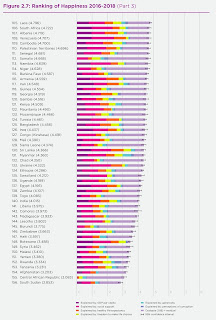The "Paradox of Religions" and the "Cycle of Religions" are two terms suggested by German Psychologist Victoria Rationi in her new book "Das Religionsparadox" (=The Paradox of Religions):
Once again (like in "Religiophobia") she argues that a high religiosity does obviously (looking at the Global Peace Index) not lead to more peaceful societies than secular societies.
She then explains her theory of the "Cycle of Religions", which presumes that religiosity prevails in societies with absent or distant fathers (and some other factors) whereas religiosity declines in societies where "caring masculinities" are on the rise.
Once again (like in "Religiophobia") she argues that a high religiosity does obviously (looking at the Global Peace Index) not lead to more peaceful societies than secular societies.
She then explains her theory of the "Cycle of Religions", which presumes that religiosity prevails in societies with absent or distant fathers (and some other factors) whereas religiosity declines in societies where "caring masculinities" are on the rise.

